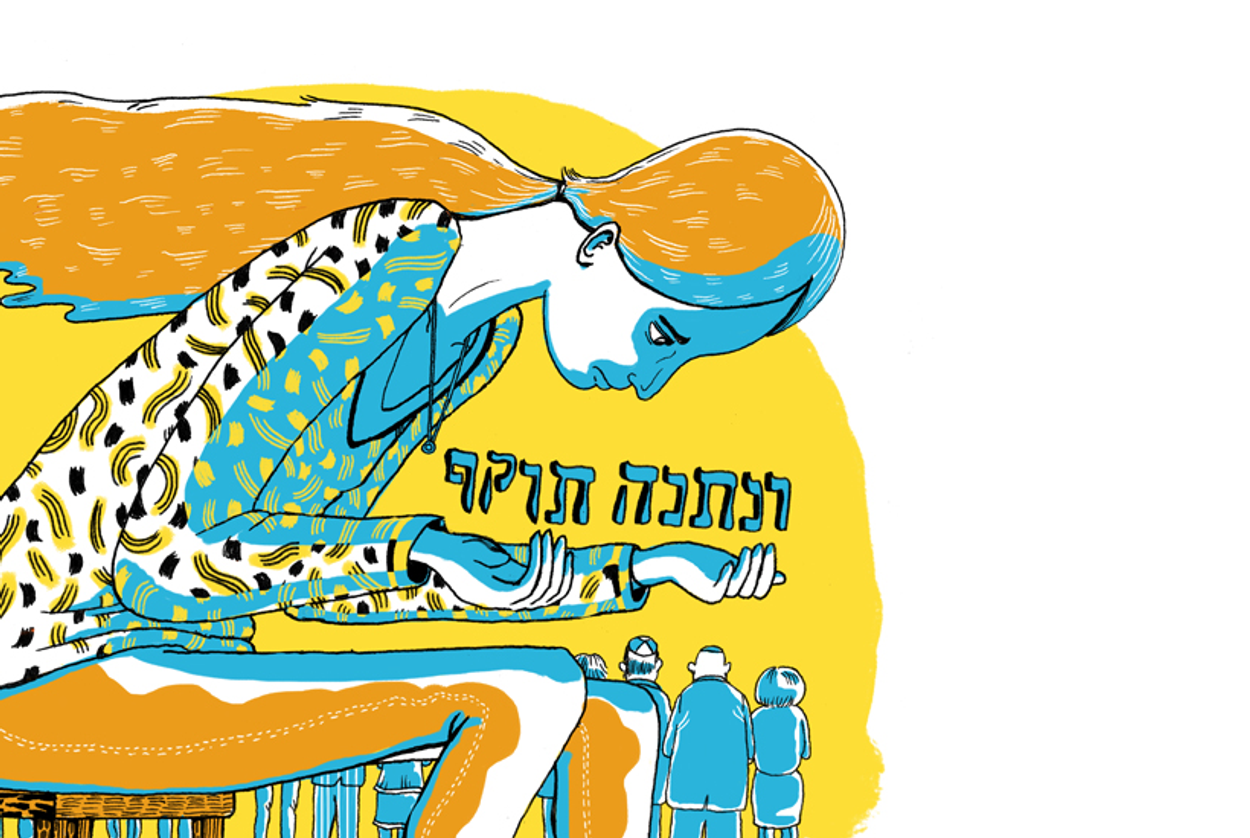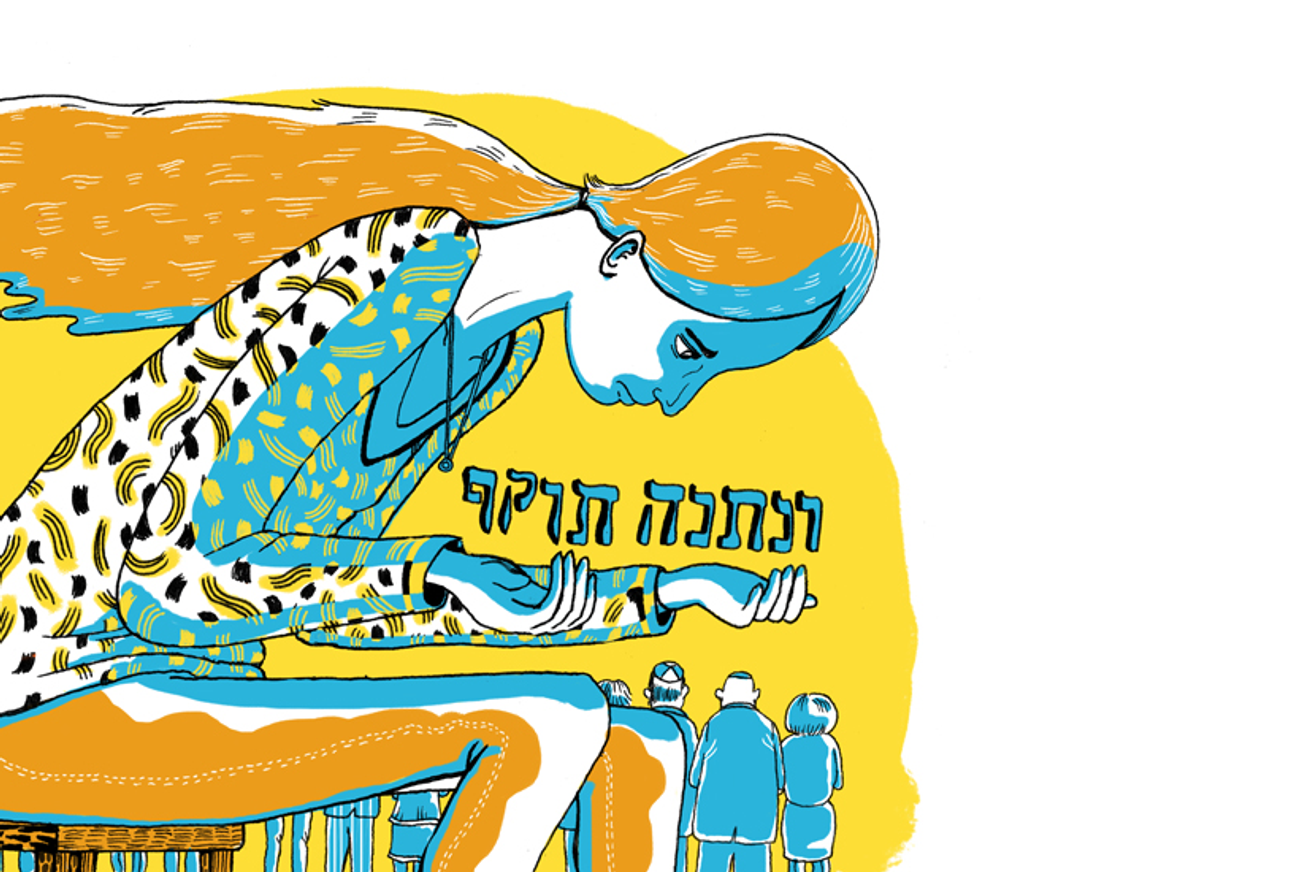Why I Stopped Saying the Unetaneh Tokef, and Why I’m Ready To Say It Again
After my mother died, I couldn’t recite the High Holiday prayer anymore—until I gained a new understanding of its words




Like most Jews, I used to recite the prayer Unetaneh Tokef every year on the High Holidays. This is the prayer that states:
On Rosh Hashanah it is written, and on Yom Kippur it is sealed.
How many will pass and how many will be created?
Who will live and who will die?
The prayer goes on to enumerate various ways a person might die: by fire, water, sword, beast, hunger, thirst, earthquake, drowning, strangling, stoning. It ends by reminding us that teshuvah and tefillah and tzedakah—repentance and prayer and righteous acts—“avert the evil decree.”
Fourteen years ago, while she was on a hike with my father off the coast of New Brunswick, my mother slipped and fell about a hundred feet from the edge of a precipice—and she died.
Although the Unetaneh Tokef had long made me uneasy with its stark imagery and invocation of a supernatural God I didn’t believe in, after my mother died the prayer took on a very personal meaning: that God had taken my mother’s life because she hadn’t sufficiently repented, prayed, and/or performed righteous acts. I couldn’t accept that. And I haven’t said that prayer since.
Of course, the Unetaneh Tokef is but one extreme example of a prayer that portrays God as punishing and all-powerful. This notion of God has never made sense to me. If I believe in God at all, it’s on a much more abstract level: God as transcendence, God as goodness. Shouldn’t I reject all prayers to a supernatural God, I’ve wondered, instead of picking on just one prayer?
Despite my misgivings, on the High Holidays and at other times during the year when I find myself at services, something pulls me to continue saying other prayers: the familiarity of the melodies and even the connection to my mother, who was once president of our congregation and a regular at services. But since she died, whenever I pray, I feel like a fraud.
To work through this dilemma, I sought guidance from someone who I figured had given these issues some thought: my rabbi, Brian Besser. He helped me see my struggles in a different light.
First he pointed out that skepticism is a kind of prayer; when I sat silent in the sanctuary during the Unetaneh Tokef, arms folded in protest, I was praying. The word “Israel,” he reminded me, means “one who struggles with God.” As Jews, we’re supposed to struggle. What we’re not supposed to do, he said, is “throw up our hands” in apathy. The poem he shared with me, “If you look at the stars” by Aaron Zeitlin, says it best:
Sing out My graces, says God.
Raise your fist against Me and revile, says God.
Sing out graces or revile:
reviling is also a kind of praise, says God.
The poem’s final stanza notes: “But if you sit fenced off in your apathy, says God … if you don’t praise and you don’t revile /Then I created you in vain, says God.”
One way of dealing with my struggle, I realized, is to embrace it rather than try to resolve it. But why pray if I don’t believe the words I’m saying?
Because, said Besser, rituals like prayer satisfy deep emotional needs that defy logic. When it comes to the realm of the emotional, it’s OK not to be consistent.
I understand the emotional pull of ritual. After my mother died, I recited the Mourner’s Kaddish every Sabbath for a year, as is traditionally required of mourners, even though the actual words, which sanctify God’s name, didn’t resonate with me at all. There was something powerful about standing up in the sanctuary with other mourners and uttering the same words, the same ones that have been uttered by Jewish mourners all over the world for many centuries.
Privileging the emotional over the rational is hard for me. I care about consistency, especially when it comes to my words and ideas. I’m a writer, after all; if the specific words I use don’t matter, what does? Words have always been important in my Jewish life, too. Growing up in a Reconstructionist congregation, I learned that if the words of a prayer didn’t accurately reflect one’s beliefs, they could be changed. As Judaic scholar Marcia Falk puts it in The Book of Blessings: “Why should we be willing to hold one set of beliefs as our truths while we articulate something very different in our worship?”
So, perhaps it’s not surprising that the idea that resonated with me most from my discussion with Rabbi Besser involved looking closely at the words of a prayer. He pointed that the Unetaneh Tokef, when properly translated, says that repentance has the power not to “avert the evil decree” but to “cause the evilness of decree to pass away.” The prayer doesn’t say that bad things won’t happen if we repent, but instead that the harshness of what happens will dissolve if we do. This idea is also reflected in the title of Harold Kushner’s famous book When Bad Things Happen to Good People. “Why bad things happen to good people is the wrong question to be asking,” Besser told me. “The right question is, when bad things happen … are you going to respond with bitterness, self-pity, despair, or are you going to respond toward life?”
In the aftermath of my mother’s death, I certainly felt bitterness, self-pity, and despair—and sometimes, I still do. But whenever I can, I try to transcend those feelings. I look for ways I can evoke my mother’s memory, whether by telling my children about her, or using one of her favorite recipes. I smile to myself when I notice ways I resemble her: the way I look in profile or my predilection for lighthearted gossip. When a friend is going through a hard time, I bring over her favorite treat from the local bakery or just listen to her cry over the phone. My experience has made me more attuned to and compassionate toward those who are suffering.
This year, taking my rabbi’s words to heart, I’ve decided to break my 14-year streak and recite the Unetaneh Tokef. I’ve found a way to understand the words so that they reflect my beliefs. I’m still not sure about other prayers. Many have words that are hard for me to endorse, but I can’t imagine not saying them. Maybe that doesn’t make me a fraud. Maybe that makes me human.
Jennifer Richler is a freelance writer living in Bloomington, Indiana.